With Nuclear Talks ‘Close To Deal,’ E3 Asks Russia Not To Add Conditions
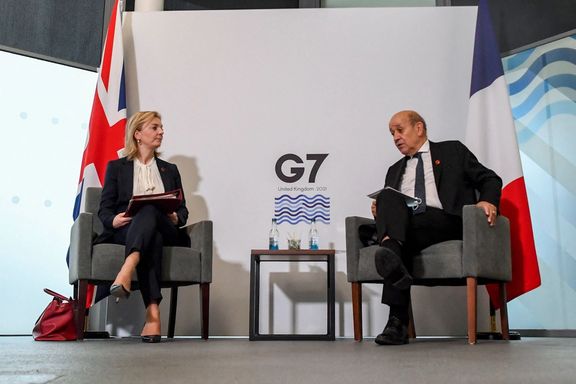
The three European parties negotiating revival of the 2015 Iran nuclear deal warned Russia on Tuesday not to complicate efforts to reach an accord.

The three European parties negotiating revival of the 2015 Iran nuclear deal warned Russia on Tuesday not to complicate efforts to reach an accord.
In joint statement to the International Atomic Energy Agency’s Board of Governors, France, Germany and the United Kingdom called on Moscow not to “add extraneous conditions.”
Russian foreign minister Sergei Lavrov said Saturday Moscow was looking for guarantees that any sanctions against Russia over Ukraine would not affect “the regime of trade-economic and investment ties embedded in the Joint Comprehensive Plan of Action [the 2015 deal] on the Iranian nuclear program.”
With talks in Vienna over JCPOA revival between Iran and six world powers – the western European trio (E3), China, Russia and the United States – reportedly nearing their end, the Ukraine crisis has cast a shadow.
The E3 said the Vienna talks were “very close to finalizing a deal that would address our most pressing and immediate non-proliferation concerns, returning Iran’s nuclear programme [sic] to JCPOA limits as well as restoring…transparency measures…The window of opportunity is closing.”
The statement called on Iran to return to limits over uranium enrichment prescribed by the 2015 deal and to prepare “to dispose of its stockpile of enriched uranium in excess of JCPOA limits.” It has been widely assumed Russia would ship out the latter.
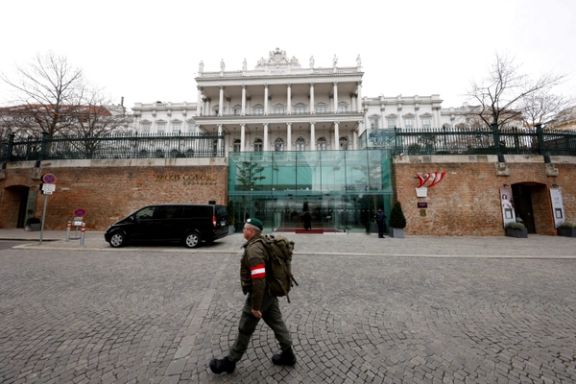
Iran’s deputy Foreign Minister Reza Najafi and its Geneva ambassador to the UN left Vienna for Iran Tuesday, Iran International reports, as nuclear talks ended.
This was a day after Ali Bagheri-Kani, Iran’s lead negotiator, left the Vienna nuclear talks and returned to Tehran for consultations. The other senior members of the Iranian team leaving the Austrian capital signaled the talks were over and that all parties now awaited decisions by politicians over reviving the 2015 Iran nuclear deal, the JCPOA (Joint Comprehensive Plan of Action).
Enrique Mora, the senior European Union official chairing the Vienna talks, tweeted Monday: “There are no longer expert level talks nor formal meetings…It is time, in the next few days, for political decisions to end the Vienna talks. The rest is noise.”
"We are very close to an agreement − it is essential we conclude while we still can," French Foreign Ministry spokeswoman Anne-Claire Legendre told reporters in a daily briefing Tuesday. "We are concerned by the risks that further delays could weigh on the possibility of concluding."
William Burns, the director of the US Central Intelligence Agency who played a central role in negotiations leading to the JCPOA in 2015, said success in reviving it would mark a "new era in our approach to Iran’s nuclear program.”
Raisi: red lines
Iran’s official news agency IRNA confirmed Tuesday there were no topics left to be discussed in Vienna, where Iran and six world powers have aimed to revive the JCPOA, and that all sides awaited decisions in Washington, Paris, London, and Berlin that could lead to an agreement within a few days.
Tehran has said it wants lifted all US sanctions incompatible with the JCPOA, including those introduced under other topics such as terror, violations of existing sanctions or human rights violations. It also wants guarantees that Washington would not again abandon the agreement, as it did in 2018.
“We have not retreated and will never retreat from any of the [country’s] red lines,” President Ebrahim Raisi (Raeesi) said Tuesday. “In the first step, the administration has seriously pursued neutralizing the sanctions and, in the second step, it seeks the removal of the sanctions during the negotiations in full dignity.”
On Monday, Iran’s Foreign Minister Hossein Amir-Abdollahian said Iran agreed with Sergei Lavrov, Russia’s foreign minister over his suggestion Saturday that any sanctions against Russia over Ukraine should not affect Russia’s ties with Iran. Russia is also expected to play a central role, especially in removing Iran’s enriched uranium stockpiles above JCPOA limits.
Blinken: shared interests
Some analysts in Iran have detected a Russian trap, while a French presidential official warned of Russian blackmail. But emphasizing the shared interest of the US and Russia in reviving the JCPOA, US Secretary of State Antony Blinken said during a visit to Estonia on Tuesday that Russia had an interest in blocking any possible Iranian path to a nuclear weapon.
"We continue to work to see if we can come back to mutual compliance with Iran on the deal,” Blinken said. “Russia continues to be engaged in those efforts and it has its own interest in ensuring that Iran is not able to acquire a nuclear weapon.”
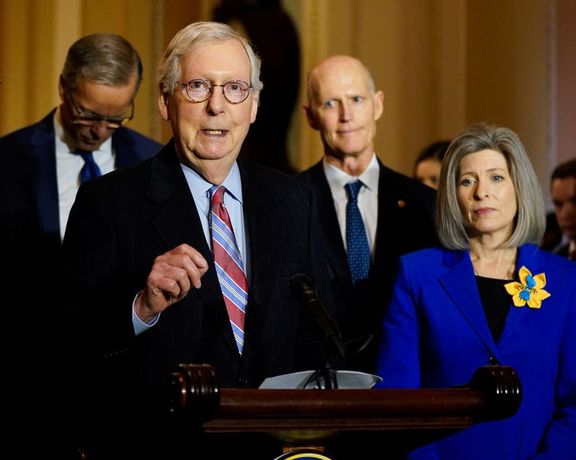
The Senate minority leader says US policies toward Iran is a concern for both Republicans and Democrats, calling for major hearings on Vienna nuclear talks.
Mitch McConnell urged the Senate Foreign Relations Committee on Monday to hold hearings before Washington reenters the nuclear deal with Tehran, saying that Congress should be consulted ahead of restoring the agreement.
Echoing earlier comments by committee Chairman Robert Menendez (D-NJ) to exert more pressure to restrict Iran’s nuclear program, missile program, and stop its attacks on American personnel and assets around the Middle East, McConnell said the decision warrants bipartisan consideration.
McConnell warned that if the administration aims to remove sanctions Congress should vote on it.
He noted that the imminent “sequel to the bad 2015 Iran nuclear deal” means “choosing weakness in the Middle East” because it is “an enormous step in the wrong direction”.
“It appears not to be a ‘longer and stronger’ deal as was promised, but a “weaker and shorter deal” that won’t “safeguard and increase our leverage over Tehran and its Revolutionary Guard”.
Referring to sevaral diplomats leaving the US negotiating team because of Special Envoy Robert Malley’s “going much too soft”, he asked the administration “to clearly explain its Middle East strategy”.
“I have encouraged them to push back strongly against Iranian aggression and contest growing Russian and Chinese influence in a region of significant interest to the United States”, he added.
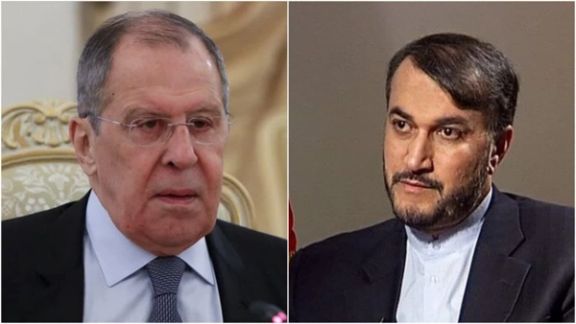
Russian demands that Ukraine sanctions should not impact its dealings with Iran have sparked controversy in Iranian media and calls to save the nuclear deal.
Russian Foreign Minister Sergey Lavrov has demanded guarantees from the United States to ensure that sanctions imposed on Russia will not affect trade between Tehran and Moscow has led to media warning the government against a "Russian Trap" and officials have been trying to make comments to save face.
Other observers such as Eurasia analyst Hassan Beheshtipour and IRNA chief Mohammad Reza Nowruzpour have also talked about the ‘Russian Trap’ in an interview with Khabar Online website.
Iranian Foreign Minister Hossein Amir Abdollahian said on Monday, March 7, that Iran will not allow any foreign element to undermine Iran's national interests in the Vienna talks.
This comes while Russia's ambassador in Tehran, Levan Dzhagaryan, told reporters that Iranians should not take reports by foreign radios too seriously. He was mindless of the fact that the comment was made by Lavrov, not any foreign radio.
Reformist daily newspaper Arman on Monday called on the Iranian government not to allow the nuclear deal with world power to be taken hostage by Russia, the country that wishes to use it as a bargaining chip in the talks with the West over Ukraine.
Iranian diplomat Hamid Abutalebi, a centrist politician, also called on the government to strike a strategic balance through direct negotiations with the United States in order to spoil the game that has been started by Russia.
Elsewhere Arman quoted Pir Mohammad Mollazehi, a seasoned political analyst, as saying that "it is time for a negative balance approach," adding that the Russians have an interest in boosting the tensions between Iran and the West.
Moderate conservative news website Khabar Online reported that Russia is offering its crude oil in the market with eye-catching discounts, and warned the Iranian government that Russia wishes to replace Iran in oil deals with China. Currently China is almost Iran's only customer and Iran reportedly sells its oil to China at a discount price. This comes while with the increased risk in transactions involving Russian oil, Iran is facing new opportunities in the global market for oil.
Hamid Hosseini, an energy market analyst and a member of the Iranian Chamber of Commerce told Khabar Online said that many countries have reduced their oil purchases from Russia without declaring any sanctions against Moscow. At the same time, insurance companies charge higher premiums for tankers carrying Russian oil, he said.
Hosseini said that the situation has made Iran effectively Russia's rival in the oil market. He added that Russia might offer its oil at a further discounted price in order to replace Iran in crude exports to China. He explained that the discount offered by Russia is twice as much the discount Iran is giving to Beijing.
Asked if under the circumstances an agreement with the United States is feasible, Hosseini said he believed a deal is within reach, and agreement may be finalized before the Iranian New Year in less than two weeks.
Hassan Beheshtipour, the Eurasia analyst, in his interview with Khabar online warned the Iranian government to adopt independent policies and avoid relying on foreign powers in order to protect the country's independence and territorial integrity.
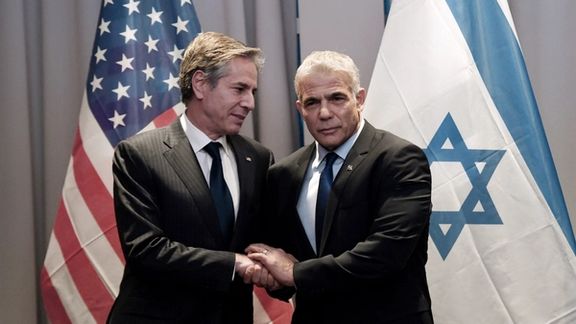
Rafael Mariano Grossi, the UN nuclear monitoring chief, highlighted Monday Ukraine and Iran as “two major issues high on the international community’s agenda.”
In his statement to the board of the International Atomic Energy Agency (IAEA), Grossi said the IAEA was monitoring the “precarious situation at Ukraine’s nuclear sites” where there had been an “unprecedented danger of a nuclear accident,” following a Russian shell hitting the Zaporizhzhya nuclear power plant.
Over Iran, Grossi confirmed that following his visit to Tehran Saturday, the agency was expecting by March 20 “written explanations, including related supporting documents” from Iran over the agency’s questions about Iranian nuclear work at three sites before 2003.
Grossi agreed in meetings with Mohammad Eslami, head of the Atomic Energy Agency of Iran (AEOI), to clear up these matters by June 20. This timetable eased fears in Vienna they might stymie talks in the Austrian capital aimed at reviving the 2015 Iran nuclear deal, the JCPOA (Joint Comprehensive Plan of Action).
Further consultations
Iran’s official news agency IRNA reported Monday that Iran’s lead negotiator Ali Bagheri-Kani was returning to Tehran for further consultations as expert groups continued work in Vienna.
While the nuclear talks have since April 2021 struggled to agree which United States sanctions contravene the JCPOA, and exactly how the expanded Iran nuclear program could be returned to JCPOA limits, the Ukraine crisis has stirred the pot.
Russian foreign minister Sergei Lavrov suggested Saturday that any sanctions against Russia over Ukraine should not affect the JCPOA and trade relations with Iran. "And we'd like to receive an answer, a very clear answer; we need guarantees that these very sanctions won't affect the regime of trade-economic and investment ties embedded in the Joint Comprehensive Plan of Action on the Iranian nuclear program," Lavrov told reporters in Moscow.
"Agreements on reinstating the JCPOA imply a set of reciprocal obligations, such as Iran's obligations as to the volume and parameters of its civilian nuclear program, and obligations of the other participants to make sure that projects for the development of civilian nuclear energy in full compliance with the Treaty on the Non-Proliferation of Nuclear Weapons, in full compliance with and under control of the IAEA, with support from Russia, China, and other countries, will be implemented," Lavrov explained.
Nuclear blackmail
Anonymous diplomats, including a French presidential official, called this “blackmail,” suggesting Moscow intends to use the JCPOA as a way to circumvent Ukraine sanctions. Some Iranian media outlets claimed Russia wanted to wreck the Vienna talks, perhaps to keep Tehran’s oil off world markets.
But the Iranian foreign ministry Monday reported a phone call between Foreign Minister Hossein Amir-Abdollahian and Lavrov in which Amir-Abdollahian agreed that Tehran’s relations with Russia should not be upset by further sanctions.
"We are against both war and sanctions,” the Iranian foreign minister said, while Lavrov had again backed Iran’s “logical demands” in the Vienna talks.
Also dealing with the fallout of the Ukraine crisis, Israeli foreign minister Yair Lapid, meeting US Secretary of State Anton Blinken in Riga, admitted to “differences” with Washington over Iran. Lapid called the agreement being readied in Vienna “bad and ineffective.”

The nuclear deal to be signed with Iran is “a bad and ineffective” agreement, Israeli foreign minister Yair Lapid said Monday after meeting US Secretary of State Antony Blinken in Riga.
Although the main topic of discussion was Israel’s diplomatic efforts to end the Ukraine crisis, the pair also discussed the talks in Vienna on a possible return to the 2015 nuclear deal between Iran and world powers.
After the meeting Lapid said Israel “is continuing its effort to prevent Iran from becoming a nuclear threshold state. The nuclear agreement which stands to be signed in Vienna is a bad and ineffective agreement.
Before the start of discussion Lapid said his meeting with Blinken comes at a time "when the world order is changing," referring to both the war in Ukraine and the nuclear talks.
While not a party to the nuclear negotiations between Iran and world powers in Vienna, Israel has conferred with the US administration in hope of wielding more clout over any revival of a 2015 deal with Tehran that was reached over its objections.
"It’s not secret we have our differences on this, but it is a conversation between allies that have a common goal which is to prevent Iran from becoming a nuclear threshold country," Lapid said before the meeting.
Meanwhile, Iran's chief nuclear negotiator Ali Bagheri Kani will return to Tehran on Monday for consultations, Iranian media reported.